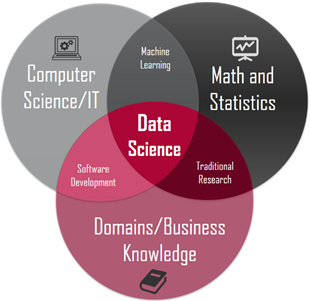Tip: You can save and share this page with your talent acquisition team.
Data scientists are one of the top growing professions in the United States. In fact, according to the U.S. Bureau of Labor Statistics, job growth for data scientists in the next decade is expected to exceed growth from the past ten years, creating 11.5M jobs by 2026.
The ideal data scientist has a balance of math knowledge, substantive expertise, and coding skills. This combination can be hard to find in a single person. Instead, focus on building a team that works together to cover these areas and ensure they have access to subject matter experts (SMEs) to fill industry or business knowledge gaps. With the right training, these business SMEs can also play the role of "citizen data scientist" using the ever-improving set of user-friendly tools bringing data science to the masses.
In the next decade, data scientists' job growth is expected to exceed growth from the past ten years, creating 11.5M jobs by 2026.

Cite: Michael Barber, Data Science Concepts You Need to Know! Part 1. Towards Data Science, Medium. January 14, 2018, towardsdatascience.com/introduction-to-statistics-e9d72d818745. Accessed November 9, 2020
Below are the top three skills that make up a successful data scientist.
- Math Knowledge: At its core, data science is applied statistics. In the past, a Ph.D. was a requirement for a data scientist. Today, there are abundant educational resources available online, so data scientists can acquire the math skills they need without spending the time and money on a terminal degree.
- Coding Skills: Data scientists need to get data from where it's stored to be processed. Sources often include internal data from data warehouses or data lakes. Leveraging external data is also essential as it creates volume and variety. Having the skills to integrate data from multiple disparate data sources is very important. Once the data has been gathered and prepared, a data scientist with programming and modeling skills can develop a solution to generate the outputs needed to address the use case.
- Tools like Azure Machine Learning Studio, Alteryx, and Knime reduce the programming requirements for citizen data scientists with the right math knowledge and substantive expertise. Data scientists with programming skills may also use these tools to gain efficiency at times.
- Substantive Expertise: The more domain knowledge a data scientist possesses, the more effectively they can design solutions to help your business. This skill takes time to build, so while your data scientists familiarize themselves with your business, they must have access to subject matter experts for guidance. Even as data scientists become experts in the industry, maintaining open lines of communication with business leaders is critical to keep data science work focused on valuable use cases.
Written by CCG, an organization in Tampa, Florida, that helps companies become more insights-driven, solve complex challenges and accelerate growth through industry-specific data and analytics solutions.